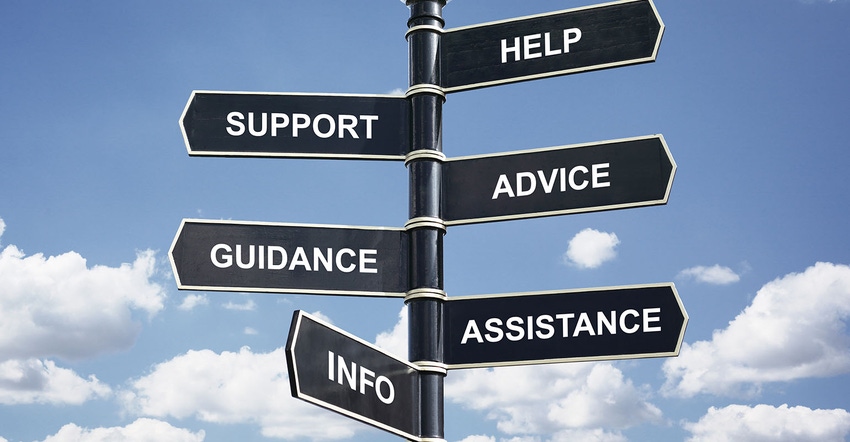Dealing with the ambiguity of COVID-19
Within every crisis lies an opportunity for development — you and only you have the ability to shape who you are as we emerge from these challenging times.

As COVID-19 continues to impact our personal and professional lives in ways thought unimaginable just a few months ago, we find ourselves filled with uncertainty and forced to confront a level of ambiguity most of us aren't comfortable dealing with. We don't know how long hog slaughter will be below the capacity needed to prevent market hog euthanasia.
In states that aren't opening up, we don't know when we'll be able to start getting back to normal. In states that are opening up, we don't know how severe the consequences of more travel, personal contact and increased disease transmission will be. The uncertainty leads to ambiguity, the ambiguity leads to anxiety and if we're not careful the anxiety will cause emotional and often short-sighted decision making. Fortunately, there are tried and true steps you can take to calm anxiety and reduce stress while accepting that ambiguity will be a part of our life for the foreseeable future.
As has often been the case with COVID-19, we as pig producers and veterinarians see analogies with managing the COVID-19 disease outbreak based on our understanding of disease management in our pig herds. We have long known about the importance of hygiene and sanitation; we live it every day at our farms. We understand strategies like isolation of high-risk individuals and have employed these practices for years. We certainly wish we could see our human population quickly implement our lessons learned in population testing strategies including less invasive sampling (Oral fluid samples for COVID-19 sampling!) and the obvious benefits of pooling samples to stretch still limited COVID-19 test kits.
Perhaps most importantly, we know the negative effects of the ambiguity that comes with a disease outbreak that can overwhelm our caretaker teams without appropriate coaching and coping strategies. While we think about it relative to a porcine reproductive and respiratory syndrome or porcine epidemic diarrhea outbreak at a sow farm, the same approach should be applied now for COVID-19.
I've heard my good friend Fred Kuhr say it many times, "PRRS-itis" is way worse than PRRS itself. We have to keep a positive mental attitude and take incremental improvement steps whenever the opportunity presents itself. Goals, targets and standards need to be adjusted to reflect the reality of our situation — we can't expect our industry to perform anywhere near normal levels while we find our supply chain bottleneck distressed and unable to accommodate the supply of market hogs we need to harvest.
So how do we deal with the effects of increased ambiguity and its associated stress and anxiety? First, we need to take a self-assessment to gauge how well you naturally handle these challenges. Ask yourself the following questions.
Person A
Do you like change?
Do you feel comfortable quickly changing work situations, job responsibilities and/or teammates?
Are you OK moving on to new projects without completing a current one?
Are you OK making decisions without having all information available to inform your thought process?
Person B
Do you like things to be done the same way time after time?
Do you find yourself wanting more data and information to support making decisions than your peers in a similar situation?
When change is proposed, do you often find yourself focused on why the change may not work or be best for all situations?
Do you want to finish everything you start before starting a new project?
If you answered mostly "Yes" to the questions under Person A then you're probably pretty skilled in dealing with ambiguity. That's not to say you love it or that you see ambiguity as a good thing, you're just naturally more comfortable being in ambiguous situations than most other people. The coping strategies employed by all to deal with ambiguity will come more natural to you and as such you're in a great position to help others employ these tactics.
If you answered mostly "Yes" to the questions under Person B then dealing with ambiguity is not something that will come as easily for you. That doesn't mean you're doomed to a life of COVID-19 misery … it just means you'll have to be more intentional about using behaviors and strategies that help deal with the uncertainty our current situation brings. You'll need to be specific about understanding the root cause of why you struggle with ambiguity and applying a specific remedy to that root cause. Let's show some examples that may help you.
Root causes and coping strategies
Root cause = Perfectionist
Coping strategy = Balance thinking with action
This is a tough one, it's hard to adjust perfectionist tendencies as perfectionists often think of their perfectionist traits as one of their greatest attributes.
You have to decrease your need for data and your need to be correct and accurate all the time. Start with small decisions and try to make them with little or no evidence to practice getting comfortable with this adjustment. You'll find the world doesn't fall apart with one bad decision.
Remember that everyone can make a good decision with 100% of the data available to support decision making. Studies suggest that the best managers are about 65% correct. Set that as your expectation to begin getting comfortable with the inevitable mistakes that will come from making decisions with incomplete information to support them.
Root cause = Feeling disorganized and/or lack normal structure
Coping strategy = Get organized and visualize the problem
Focus on one specific problem at a time; don't let multiple problems make the situation seem more complex than it needs to be. If you have to reschedule loads, implement strategies to minimize market hog weights and change your wean pig flows all to handle the marketing crisis, don't try to fix these problems simultaneously, but rather brainstorm the best potential solutions for each independent of each other.
Lean on your current processes and procedures leveraging lessons learned from previous similar situations as often as you can. You've had to make flow changes before — whether it was summer's decreased average daily gain, a flood that prevents you from using a barn or a disease outbreak that makes you wean down to 7 days of age —we've done this before, and our team is already set up to make these changes. Let them use their normal work processes as much as possible.
Where you don't have an existing management tool, process map out the problem you're working on. What are the inputs to the processes and where are the critical decision points? Use a list of pros and cons to highlight problems that have alternative solutions — use white boards and sticky notes so you can visualize changes to various process steps and project out what unintended consequences may be predicted and managed. Fishbone diagrams are an excellent tool to support this process — it helps to break down potential problems into categories. Fancy software exists for this exercise, but a white board or piece of paper and pencil work just fine to get started.
Root cause = Feeling overwhelmed
Coping strategy = Take minor, incremental steps
Acting with little precedent to guide your decisions means you have to take small actions and see what happens to adjust your next actions accordingly.
Don't feel like you have to get it perfect the first time, with new problems we almost always need several problem-solving attempts to get to the right answer.
Know the more uncertain your situation, the more likely you are to make mistakes — adjust your expectations accordingly.
Start small and take incremental steps … but don't delay as time is of the essence so we need to try things, evaluate the outcome and improve our efforts based on this feedback loop.
Regardless of how you deal with the personal and professional ambiguity of COVID-19, know that right now it is most important to be flexible and there is less of a premium placed on being right at all costs. If you find yourself struggling with uncertainty and stress, read through these root causes and coping strategies — pick the one that best fits your situation and start applying it.
Need a kickstart? Take on a tough project or one you'd normally see as undoable, one where your peers may have even failed. Again, start with small actions and take incremental steps — reserve the right to get smarter every day. You'll quickly gain some confidence to help you effectively move forward even in situations where you're not as comfortable making decisions as you'd like to be.
Once you feel comfortable with your own ability to manage ambiguity, shift your efforts toward helping your team. If you're "Person A" in the example above, we need your help now! Friends, family and coworkers who are struggling can be easily identified — talk to them about their challenges and offer suggestions of how you might work through similar situations. Know that listening will be critically important, sometimes people just need to vent and blow off steam to clear their mind. Most importantly, just be there for them as to get through the impact of COVID-19 we need each other now more than ever.
I want to leave you with a quote about ambiguity that's near and dear to my heart. Many of you will remember Gilda Radner and her battle with cancer. When addressing the ambiguity that came with her terminal cancer diagnosis she was quoted as saying "Life is about not knowing, having to change, taking the moment and making the best of it, without knowledge what's going to happen next. Delicious ambiguity!"
There is a lifetime worth of lessons in those two sentences. Go forward knowing that while we can't accurately predict the future, we can effectively prepare for it by planning our response to the various possible future events. You aren't alone in facing the same reality upsetting the rest of the world. Within every crisis lies an opportunity for development — you and only you have the ability to shape who you are as we emerge from these challenging times. Take one step at a time and most importantly, take care of yourself and your teammates.
Source: Clayton Johnson, who is solely responsible for the information provided, and wholly owns the information. Informa Business Media and all its subsidiaries are not responsible for any of the content contained in this information asset. The opinions of this writer are not necessarily those of Farm Progress/Informa.
About the Author(s)
You May Also Like





